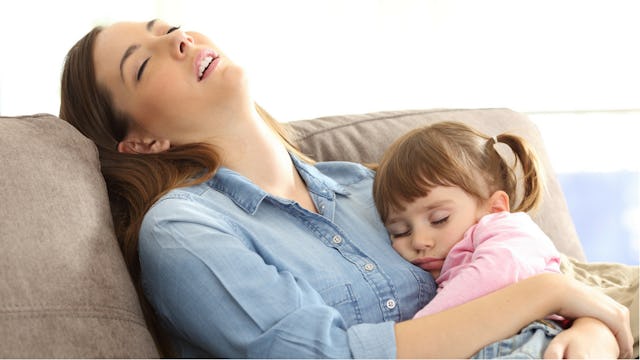New Study Confirms Parents Are Burned The Eff Out. Here's Why.

A recent study has confirmed that parents are feeling overwhelmed and burnt out.
Parents everywhere:
via Giphy
It’s no surprise to anyone raising kids that this shit is exhausting. Especially for working moms, who carry the non-stop mental load of parenting along with juggling deadlines, meetings, spreadsheets, and other demands at work.
And almost 30 percent of parents agreed that “both parents working” is one of the greatest challenges to parenting today. We’re trying to give our family all the love and attention they deserve, while simultaneously trying to kick ass at work, and it’s taking its toll on our mental and physical health.
“Parental burnout is a state of physical, mental, and emotional exhaustion,” notes Neil D. Brown LCSW, author of Ending The Parent-Teen Control Battle. “It leaves parents feeling chronically fatigued often experiencing sleep and concentration problems, and it can lead to depression, chronic anxiety, and illness.”
Over 60 percent of 2,000 parents surveyed report they have experienced some form of parental burnout. 40 percent of survey respondents said that parental burnout had significantly impacted their quality of life.
via Giphy
When asked if it’s harder to raise children today than when they were growing up, nearly 90 percent of parents said that it is. Here’s what they listed as the top five challenges to healthy parenting in modern society:
- Social media distractions (29 percent)
- Both parents working (27 percent)
- Emotional or behavioral dysfunction (24 percent)
- Peer expectations and competition, including bullying (21 percent)
- Violence and safety concerns in schools (18 percent)
They listed their biggest, most direct contributors to parental burnout as:
- Lack of cooperation from children or teenagers (33 percent)
- Pressure or exhaustion from work or managing the home (29 percent)
- Financial concerns, pressures or limitations (29 percent)
- Too many digital device and social media distractions for kids and teens (26 percent)
- Overloaded commitments and activities involving children (21 percent)
There are some recurring factors here about pressure from work, as well as the financial stress that often leads to both parents having to work. We have so much pressure and so many expectations to accommodate, it’s not surprising that parents are burnt the eff out.
“Right now as a society we are struggling with mushrooming mental health and behavioral health problems and we can’t keep chasing symptoms. We have to take action to support parents if we want a healthy society with healthy kids,” says author and psychotherapist Neil D. Brown.
Brown also has some suggestions for parents coping with burnout that include:
– Set clear, appropriately high standards for kids and teens. Include them and teach them how to participate in household responsibilities (i.e., vacuuming, sweeping, food preparation and cleanup, etc.).
– Be clear that privileges (such as electronic devices, screen time, time with friends, allowance) only come with responsible, cooperative behavior. Don’t threaten, let them succeed or fail.
– Use a positive tone when setting expectations and enforcing limits.
– Know your child or teen’s personality and engage them accordingly. Some kids are highly sensitive while others more competitive. Some are intense while others are more easy-going. Know if your child or teen needs things written down or specific times and a sequence for doing things.
– Establish clear limits and standards for use of devices in the home.
– Get more adult fun time. Take back a past pleasure or start a new one such as art, music, dance, or an athletic activity.
You hear that last one, mamas? RECLAIM YOUR TIME. We can’t always put everyone else first and ourselves last; it’s not sustainable. So reclaim your self-care, learn to say “no,” and make some time for you to do whatever makes you happiest.
You can’t pour from an empty cup, so make time to refill yours. Your mental and physical health may depend on it.
This article was originally published on